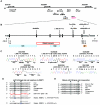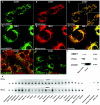Mutations in the novel mitochondrial protein REEP1 cause hereditary spastic paraplegia type 31
- PMID: 16826527
- PMCID: PMC1559498
- DOI: 10.1086/505361
Mutations in the novel mitochondrial protein REEP1 cause hereditary spastic paraplegia type 31
Abstract
Hereditary spastic paraplegia (HSP) comprises a group of clinically and genetically heterogeneous diseases that affect the upper motor neurons and their axonal projections. For the novel SPG31 locus on chromosome 2p12, we identified six different mutations in the receptor expression-enhancing protein 1 gene (REEP1). REEP1 mutations occurred in 6.5% of the patients with HSP in our sample, making it the third-most common HSP gene. We show that REEP1 is widely expressed and localizes to mitochondria, which underlines the importance of mitochondrial function in neurodegenerative disease.
Figures





References
Web Resources
-
- GenBank, http://www.ncbi.nlm.nih.gov/Genbank/ (for the REEP1 protein [accession number NP_075063] and REEP1 mRNA [accession number NM_022912])
-
- MicroRNA Registry, http://microrna.sanger.ac.uk/
-
- Online Mendelian Inheritance in Man (OMIM), http://www.ncbi.nlm.nih.gov/Omim/ (for KIF5A, HSP60, NIPA1, REEP1, and SPG7)
References
Publication types
MeSH terms
Substances
Associated data
- Actions
- Actions
LinkOut - more resources
Full Text Sources
Other Literature Sources
Medical
Molecular Biology Databases
Research Materials

